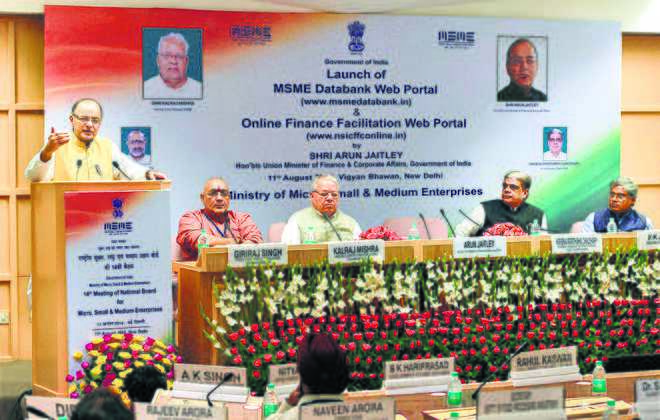
RESOLVING THE IMPASSE: The RBI effectively legitimised the delay in repaying stressed standard assets of MSMEs.
Subir Roy
Senior economic analyst
THE Indian economy has just managed to swerve and avoid a collision which would have had an enormous downside. After an escalating public spat, the Reserve Bank of India (RBI), the financial regulator, and the government decided to take a step back. The meeting of the RBI board held on Monday was intensive (it lasted over nine hours!) but driven by logical discourse which yielded wholly sensible results.
The spirit of meeting each other halfway was best illustrated by the decision on the key government demand that the RBI pass on to it Rs 3.6 lakh crore of its reserves. The stakes were high as the government needed to both maintain its record of fiscal discipline while loosening the purse strings a little in the run-up to the general election. For its part, the RBI was loathe to let go of its reserves which would be crucial in conducting open market operations to maintain financial stability, both internally (capital markets) and externally (value of the rupee).
The solution was to set up a committee. Its membership and terms of reference would be jointly decided by both the sides. The committee can be expected to look at global practices to set up a framework for determining the RBI’s revised capital requirements. Hopefully, in future this will remove subjectivity and hence scope for disagreement in trying to determine how much of reserves is enough.
Interestingly, another key issue, the capital needs of non-banking finance companies (NBFCs) in the aftermath of the default by Infrastructure Leasing and Financial Services (ILFS), was resolved even before the board meeting commenced. As the market hesitated to offer fresh capital to NBFCs and they faced higher interest rates while refinancing their lines of credit, the government was keen on the RBI making capital available to the sector. But shortly before the meeting, the State Bank of India chairman declared that there was no shortage of capital for NBFCs as those that needed to have been able to complete their rollover exercises. Hence, there was no decision by the RBI to set up a special window for NBFC, as presumably because of the changed circumstances, the government did not persist with the demand.
The third key demand of the government was to provide liquidity to the micro small and medium enterprises (MSME) sector which had been passing through a tough time after the twin shocks of demonetisation and introduction of GST. While the former took away cash, the latter required small businesses to have more cash so they could meet their tax liabilities and wait for refunds as the new GST system got over its teething troubles. To address this issue the RBI agreed to the restructuring (effectively legitimising delay in repayment) of stressed standard assets of firms with credit limits of up to Rs 25 crore. So now, small and medium units need not stop operations because of lack of working capital in the run-up to the elections. This will critically protect jobs in a situation in which they are a major subject of public discourse.
But to restructure or reschedule loans to small and medium units, their financiers, banks and NBFCs, must have resources themselves. While NBFCs have been taken care of, banks are another matter. Around half of the nationalised banks that account for over two-thirds of the banking sector are sick and have been put under ‘prompt corrective action’ (PCA) which prevents them from giving fresh loans. The government wanted the RBI to ease the PCA regime.
Without actually diluting norms (there cannot be a healthy financial sector without a healthy banking sector), the RBI has decided to entrust the task of reviewing the list of banks under the PCA to one of its committees. It is up to the owners of the banks, the government, to nurse them back to health and once they do so and return to profitability, this committee should have no problem in taking them out of the PCA framework.
The contours of the various understandings and agreements indicate that there was considerable give and take. This is because the public spat between the two clarified various realities. The paramount one is that the government is the final authority and under Section 7 of the relevant statute, it can pretty much tell the RBI what to do and not do. But this is an all-encompassing power that has never been used in 70 years and is likely to be used only in the case of an absolute emergency or total deadlock.
Plus, ever since India began liberalising since the 90s and fell in line with global norms that have increasingly turned market-friendly, the government has to be very mindful of how much space it is seen to be giving its key financial regulator. If global markets disapprove of official Indian action, Indian markets will have nowhere to go.
These learnings have substantially secured the extensive de facto autonomy which the central bank ought to have. For its part, the regulator has to maintain a very high level of efficiency and cannot be seen to be irrational. The spat has set a precedent for periodic intensive public or government scrutiny of the functioning of the RBI. It cannot get away by simply saying ‘RBI knows best’. This in its own way will keep the RBI on its toes by both accessing the best professional skills and getting rid of some of its own bureaucratic mindset.



























